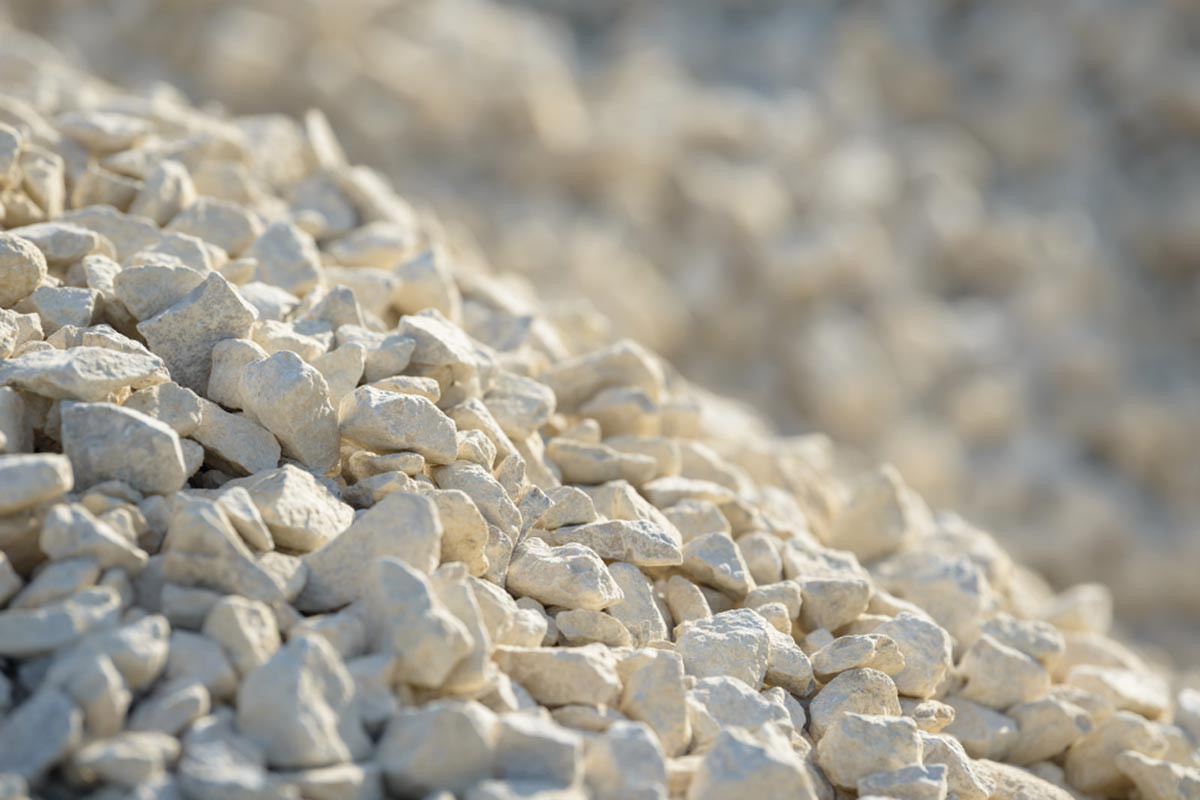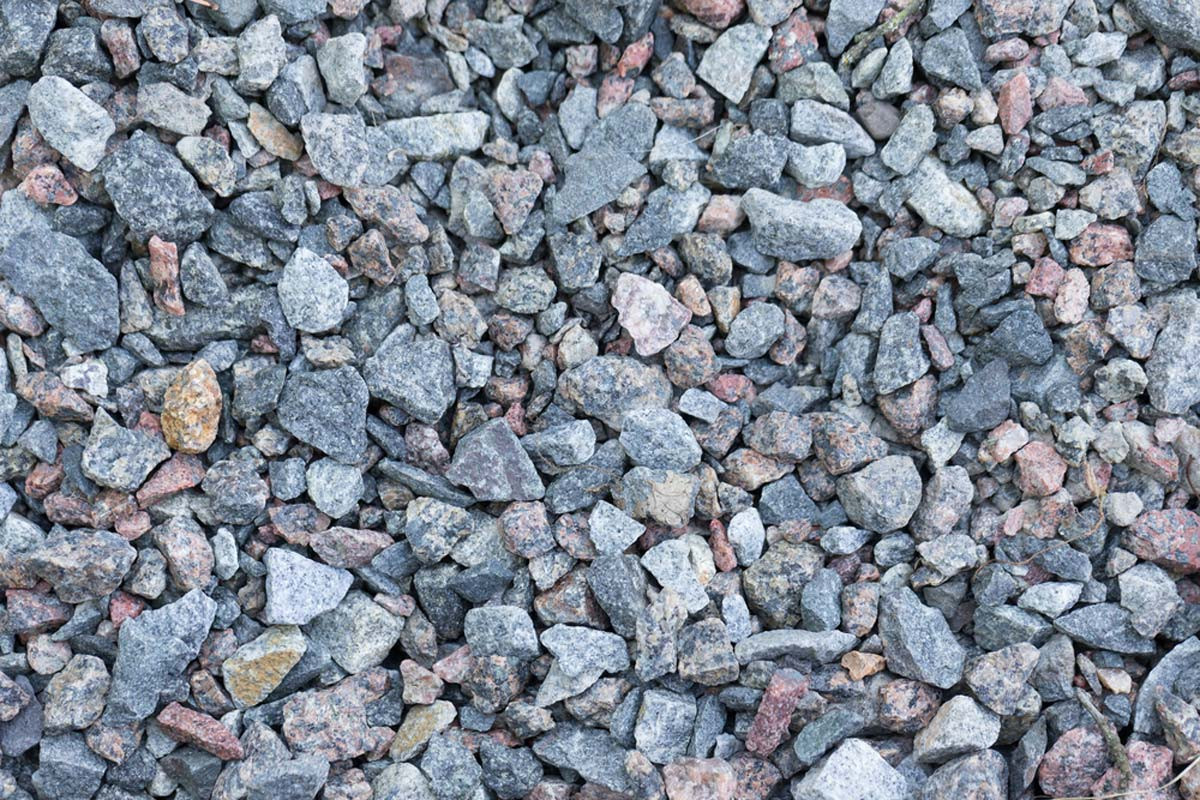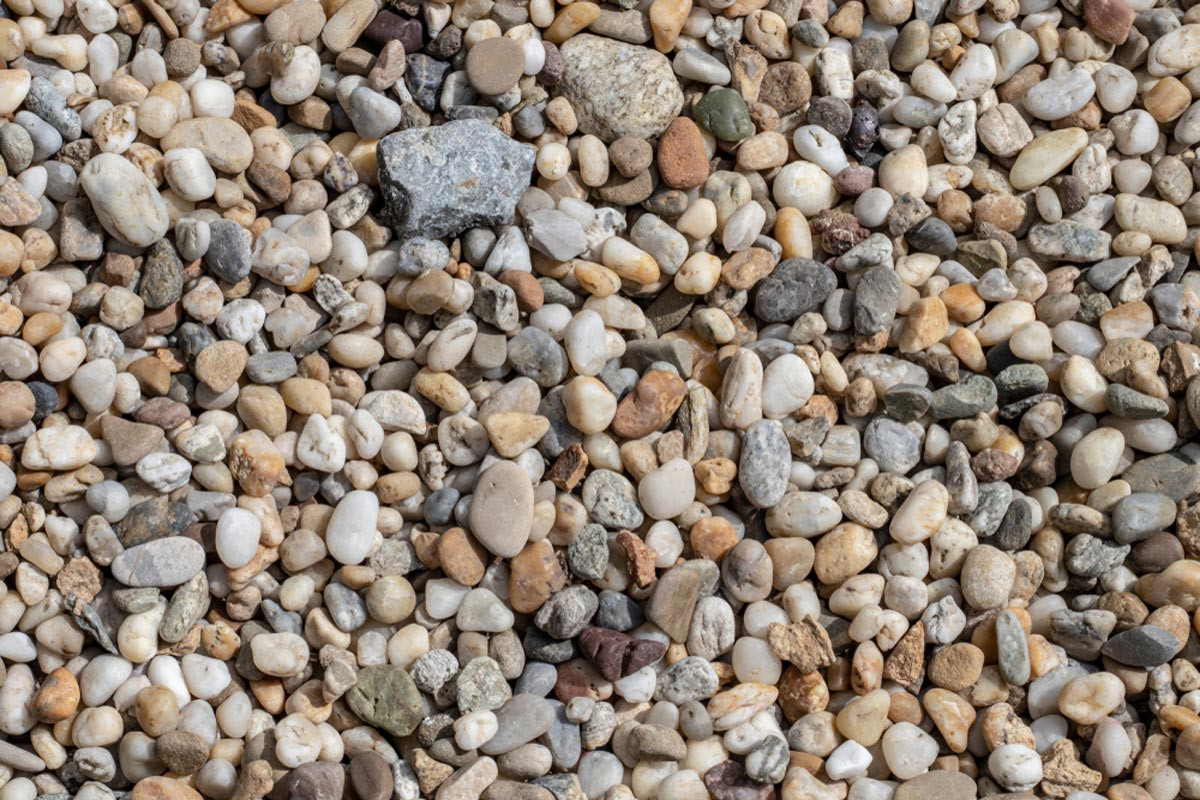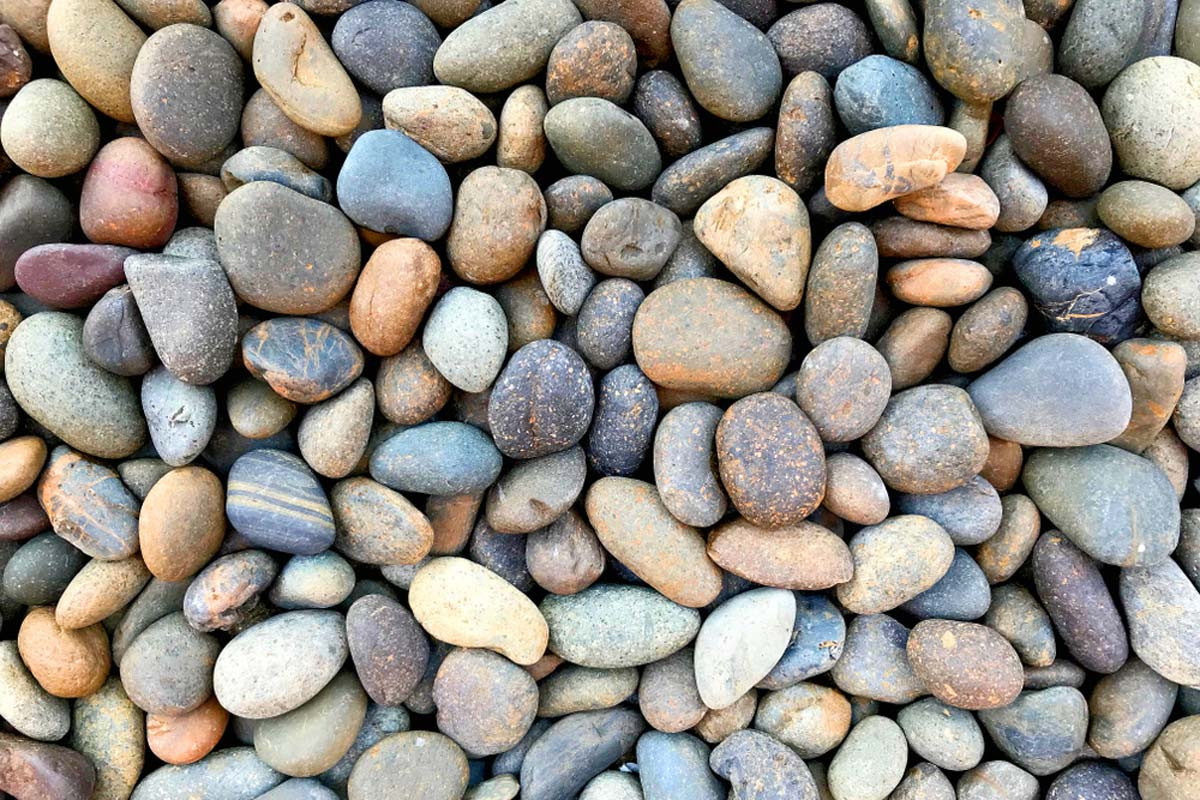Base rock is a foundational element in landscaping and construction projects. Are you wondering How Much Does Base Rock Cost? Base rock prices can vary widely, and at rockscapes.net, we’re dedicated to providing you with the insights you need to make informed decisions. This comprehensive guide explores the various factors influencing base rock costs, ensuring you get the best value for your investment and discover creative rock landscape ideas. You can find a plethora of information on decorative gravel, crushed stone, and landscape design inspiration at rockscapes.net.
1. Understanding Base Rock and Its Importance
Base rock, also known as aggregate base, is a crucial material used in construction and landscaping projects. It provides a stable foundation for driveways, walkways, patios, and even buildings. Its primary function is to distribute weight evenly, prevent erosion, and ensure proper drainage. Understanding the importance of base rock is the first step in appreciating its value and how much it truly costs to acquire and implement.
What Exactly is Base Rock?
Base rock is typically made from crushed stone, gravel, or a combination of both. The size and type of rock used can vary depending on the specific application. For example, road base often consists of larger, angular rocks that interlock tightly when compacted, providing a solid foundation for asphalt or concrete.
Why is Base Rock Important?
- Stability: Base rock provides a stable and level surface for construction. Without it, the overlying materials may shift, crack, or sink over time.
- Drainage: It allows water to drain away from the surface, preventing waterlogging and erosion.
- Weight Distribution: Base rock distributes the weight of heavy loads, such as vehicles, evenly across the underlying soil.
- Prevents Mud: It stops mud beds from forming in driveways.
Base Rock Applications
Base rock is used in a variety of applications, including:
- Driveways: Providing a stable base for gravel, asphalt, or concrete driveways.
- Walkways and Paths: Creating a solid foundation for pedestrian walkways and garden paths.
- Patios: Ensuring a level and well-drained surface for patios made of pavers, stone, or concrete.
- Foundations: Supporting building foundations by distributing weight and preventing settling.
- Roads: Forming the sub-base for roads and highways.
- Landscaping: Used as a base for landscaping projects, such as rock gardens and retaining walls.
2. Key Factors Influencing the Cost of Base Rock
Several factors can influence the cost of base rock, and being aware of these elements can help you budget more accurately for your project. These factors range from the type of base rock to transportation costs and market demand.
Type of Base Rock
The type of base rock you choose will significantly impact the price. Different materials have varying costs due to their availability, processing requirements, and performance characteristics.
- Crushed Stone: Typically made from limestone, granite, or trap rock, crushed stone is a common and versatile option.
- Gravel: Gravel can range from pea gravel to larger river rock, each with its own price point.
- Crushed Concrete: A more eco-friendly option, crushed concrete is made from recycled concrete and can be a cost-effective alternative.
- Recycled Asphalt: Recycled asphalt millings are another sustainable choice, often available at a lower cost than virgin materials.
- Road Base Gravel: Prevents dirt from mixing with the top layer of gravel.
Quantity Needed
Like many materials, base rock is often cheaper when purchased in bulk. The total volume you need for your project will influence the overall cost, and it’s worth calculating your requirements accurately to take advantage of bulk discounts.
Delivery Distance and Transportation Costs
Transportation costs can add a significant premium to the price of base rock, especially if you are located far from the quarry or supplier. Delivery charges typically depend on the distance, the volume of material, and the type of vehicle required.
Location and Market Demand
Regional variations in supply and demand can also affect base rock prices. Areas with limited local sources may have higher prices due to increased transportation costs. Seasonal demand can also play a role, with prices potentially increasing during peak construction seasons.
Quality and Grading
The quality and grading of base rock can also influence its cost. Higher-quality materials that meet specific grading standards may command a higher price but offer better performance and longevity.
Supplier and Vendor Pricing
Different suppliers and vendors may have varying pricing structures based on their overhead costs, profit margins, and competitive landscape. Shopping around and comparing quotes from multiple suppliers can help you find the best deal.
3. Types of Base Rock and Their Associated Costs
Understanding the different types of base rock and their specific costs can help you make the right choice for your project. Each type has its own unique properties and applications, influencing its price.
Crushed Stone
Crushed stone is one of the most common types of base rock, known for its durability and versatility.
- Cost: $10 to $50 per ton
- Uses: Driveways, walkways, patios, and building foundations.
 Crushed Stone
Crushed Stone
Gravel
Gravel is a widely available and relatively inexpensive option, suitable for various applications.
- Cost: $15 to $75 per cubic yard
- Uses: Driveways, walkways, landscaping, and drainage.
Crushed Concrete
Crushed concrete is an eco-friendly and cost-effective alternative to traditional base rock.
- Cost: $11 to $53 per ton
- Uses: Driveways, foundations, and sub-base for roads.
Recycled Asphalt Millings
Recycled asphalt millings are another sustainable option, often available at a lower cost than virgin materials.
- Cost: $10 to $27 per ton
- Uses: Driveways, parking lots, and road construction.
Road Base
Road base is a durable mixture of crushed stones that interlock well together when compacted.
- Cost: $18 to $30 per ton
- Uses: Driveways, road construction, and base layers for asphalt or concrete.
Decomposed Granite
Decomposed granite is an excellent choice for pathways, driveways, and garden trails. It offers a natural look and feel while providing a stable surface.
- Cost: $25 to $50 per ton
- Uses: Pathways, driveways, garden trails.
 Decomposed Granite Gravel
Decomposed Granite Gravel
Pea Gravel
Pea gravel is small, rounded stones that are ideal for decorative purposes, pathways, and play areas.
- Cost: $28 to $45 per ton
- Uses: Pathways, decorative landscaping, play areas.
 Pea Gravel
Pea Gravel
River Rock
River rock is larger, smooth stones that add a natural and aesthetic appeal to landscaping projects.
- Cost: $33 to $49 per ton
- Uses: Landscaping, decorative accents, drainage.
 River Rock
River Rock
4. Average Base Rock Costs: A Detailed Breakdown
To give you a clearer picture of what you can expect to pay, here’s a detailed breakdown of average base rock costs based on different units of measurement and project types.
Cost Per Ton
The cost per ton is a common way to price base rock, especially for larger projects.
- Average Cost: $10 to $50 per ton
- Factors Influencing Cost: Type of rock, quality, and supplier.
Cost Per Cubic Yard
The cost per cubic yard is another common metric, particularly useful for estimating the volume needed for your project.
- Average Cost: $15 to $75 per cubic yard
- Factors Influencing Cost: Type of rock, supplier, and delivery distance.
Cost Per Square Foot
For smaller projects, such as walkways or small patios, the cost per square foot can be a helpful way to estimate expenses.
- Average Cost: $1 to $3 per square foot
- Factors Influencing Cost: Depth of base rock, type of material, and labor costs.
Truck Load Cost
For large-scale projects, purchasing a truckload of base rock may be the most efficient option.
- Average Cost: $1,350+ per truck load (10 cubic yards minimum)
- Factors Influencing Cost: Truck size, delivery distance, and type of rock.
Project-Specific Costs
To provide more context, here are some average costs for common projects using base rock:
- Gravel Walkway (4’x20’): $250 installed
- Gravel Patio (10’x20’): $450 installed
- Gravel Driveway (Single Car): $600 to $1,800 installed
5. Base Rock Cost Calculator: Estimating Your Project Expenses
To accurately estimate the amount and cost of base rock needed for your project, consider the following calculations:
Calculating Volume
-
Measure the Length, Width, and Desired Depth: All measurements should be in feet.
-
Calculate Cubic Feet: Multiply Length x Width x Depth.
-
Convert to Cubic Yards: Divide the cubic feet by 27 (since there are 27 cubic feet in a cubic yard).
Volume (cubic yards) = (Length (ft) x Width (ft) x Depth (ft)) / 27
Estimating Weight
-
Determine the Density of the Base Rock: The density is typically given in pounds per cubic foot (lbs/ft³).
-
Calculate the Total Weight in Pounds: Multiply the volume in cubic feet by the density.
-
Convert to Tons: Divide the total weight in pounds by 2,000 (since there are 2,000 pounds in a ton).
Weight (tons) = (Volume (ft³) x Density (lbs/ft³)) / 2000
Cost Estimation
-
Find the Cost per Cubic Yard or Ton: Contact local suppliers for pricing.
-
Calculate the Total Cost: Multiply the volume (in cubic yards) or weight (in tons) by the cost per unit.
Total Cost = Volume (cubic yards) x Cost per Cubic Yard
or
Total Cost = Weight (tons) x Cost per Ton
Example Calculation
Let’s say you need base rock for a driveway that is 50 feet long, 12 feet wide, and you want a depth of 6 inches (0.5 feet).
-
Volume Calculation:
- Cubic Feet = 50 ft x 12 ft x 0.5 ft = 300 ft³
- Cubic Yards = 300 ft³ / 27 = 11.11 cubic yards
-
Weight Estimation:
- Assume the base rock density is 120 lbs/ft³
- Total Weight in Pounds = 300 ft³ x 120 lbs/ft³ = 36,000 lbs
- Weight in Tons = 36,000 lbs / 2,000 = 18 tons
-
Cost Estimation:
- Assume the cost per cubic yard is $40
- Total Cost = 11.11 cubic yards x $40/cubic yard = $444.40
Or, if priced per ton:
- Assume the cost per ton is $25
- Total Cost = 18 tons x $25/ton = $450
Factors to Consider:
- Compaction: Remember that base rock will compact when it is installed. Account for a compaction factor of around 10-20% when estimating the amount needed.
- Waste: Always order a little extra to account for waste due to spillage or uneven distribution.
- Delivery Fees: Don’t forget to include delivery fees when calculating your total cost.
- Local Variations: Costs can vary significantly based on your location and local market conditions.
By following these calculations and keeping these factors in mind, you can create a more accurate estimate for your base rock project.
6. Finding the Best Deals on Base Rock
To ensure you get the best possible price on base rock, here are some strategies for finding deals and discounts:
Shop Around and Compare Quotes
Contact multiple suppliers and vendors to get quotes for the type and quantity of base rock you need. Compare prices, delivery charges, and any additional fees to find the most competitive offer.
Buy in Bulk
Purchasing base rock in bulk can often result in significant savings. Determine the total quantity you need for your project and inquire about bulk discounts from suppliers.
Consider Off-Season Purchases
Construction materials may be cheaper during the off-season when demand is lower. Consider purchasing base rock during the fall or winter months to take advantage of potential discounts.
Look for Recycled Materials
Recycled materials, such as crushed concrete and recycled asphalt millings, are often more cost-effective than virgin materials. Check with local suppliers to see if they offer these options.
Check for Local Quarries
Buying directly from a local quarry can eliminate transportation costs and potentially offer lower prices. Search for quarries in your area and inquire about their pricing and delivery options.
Negotiate Prices
Don’t be afraid to negotiate prices with suppliers, especially if you are purchasing a large quantity of base rock. Many suppliers are willing to offer discounts or match competitor prices to secure your business.
7. DIY vs. Professional Installation: Weighing the Costs
Deciding whether to install base rock yourself or hire a professional can impact the overall cost of your project. Here’s a breakdown of the factors to consider:
DIY Installation
Pros:
- Cost Savings: You can save on labor costs by doing the work yourself.
- Flexibility: You have more control over the project timeline and can work at your own pace.
Cons:
- Time and Effort: Installing base rock can be physically demanding and time-consuming.
- Equipment and Tools: You may need to rent or purchase specialized equipment, such as a compactor or skid steer.
- Expertise: Proper installation requires knowledge of grading, compaction, and drainage techniques.
Professional Installation
Pros:
- Expertise and Experience: Professionals have the knowledge and experience to ensure proper installation.
- Efficiency: They can complete the project quickly and efficiently, saving you time and effort.
- Equipment and Tools: Professionals have access to the necessary equipment and tools.
Cons:
- Higher Costs: Hiring a professional will increase the overall cost of your project due to labor fees.
- Scheduling: You will need to coordinate with the contractor’s schedule, which may delay the project.
Cost Comparison
To illustrate the cost differences, consider a gravel driveway project. DIY installation may cost $300 to $900 for materials, while professional installation could range from $600 to $1,800, including labor.
Making the Decision
Ultimately, the decision to DIY or hire a professional depends on your budget, skills, and time availability. If you have experience with similar projects and are comfortable with the physical demands, DIY installation can be a cost-effective option. However, for larger or more complex projects, hiring a professional may be the best choice to ensure a successful outcome.
8. Base Rock Maintenance and Longevity
Proper maintenance is essential for ensuring the longevity and performance of base rock installations. Regular maintenance can prevent erosion, maintain stability, and extend the lifespan of your project.
Regular Inspections
Conduct regular inspections of your base rock surfaces to identify any signs of damage, erosion, or instability. Look for cracks, potholes, or areas where the material has shifted.
Weed Control
Control weeds and vegetation growth on base rock surfaces to prevent root damage and maintain a clean appearance. Use herbicides or manual removal techniques to keep weeds at bay.
Drainage Maintenance
Ensure that drainage systems, such as culverts and ditches, are clear of debris and functioning properly. Proper drainage is essential for preventing waterlogging and erosion.
Compaction
Re-compact base rock surfaces as needed to maintain stability and prevent settling. Use a plate compactor or roller to compact the material and ensure a solid foundation.
Surface Repairs
Repair any cracks, potholes, or eroded areas promptly to prevent further damage. Fill in damaged areas with new base rock material and compact it thoroughly.
Reapplication
Over time, base rock surfaces may require reapplication of material to maintain the desired depth and stability. Add a fresh layer of base rock as needed and compact it to create a smooth, even surface.
9. Enhancing Your Landscape with Decorative Rockscapes
While base rock provides the essential foundation, decorative rockscapes can elevate the aesthetic appeal of your outdoor spaces. Incorporating decorative stones, gravel, and boulders can transform your landscape into a visually stunning and inviting environment. Rockscapes.net is your go-to resource for innovative ideas and high-quality materials to create breathtaking rockscapes.
Rock Gardens
Create a rock garden featuring a variety of decorative stones, gravel, and drought-tolerant plants. Rock gardens add texture, color, and visual interest to your landscape.
Pathways and Walkways
Use decorative gravel or flagstone to create pathways and walkways that complement your garden design. Choose materials that are comfortable to walk on and blend seamlessly with the surrounding landscape.
Water Features
Incorporate water features, such as fountains or ponds, surrounded by decorative rocks and stones. The combination of water and stone creates a tranquil and visually appealing focal point.
Retaining Walls
Build retaining walls using natural stone or pre-cast concrete blocks to create terraced gardens or prevent soil erosion. Retaining walls add structure and dimension to your landscape.
Borders and Edging
Use decorative stones or gravel to create borders and edging around flower beds, trees, and shrubs. Edging defines planting areas and adds a polished look to your landscape.
Boulders and Accents
Incorporate large boulders or accent stones to add drama and visual interest to your landscape. Boulders can serve as focal points or natural sculptures.
10. Frequently Asked Questions (FAQs) About Base Rock Costs
1. What is base rock and why is it important?
Base rock is a foundational material used in construction and landscaping to provide stability, drainage, and weight distribution for driveways, walkways, patios, and foundations.
2. How much does base rock cost per ton on average?
The average cost of base rock ranges from $10 to $50 per ton, depending on the type of rock, quality, and supplier.
3. What is the average cost of base rock per cubic yard?
Base rock typically costs between $15 and $75 per cubic yard, influenced by the type of rock, supplier, and delivery distance.
4. What factors affect the cost of base rock?
Key factors include the type of base rock, quantity needed, delivery distance, location, quality, grading, and supplier pricing.
5. Is it cheaper to buy base rock in bulk?
Yes, buying base rock in bulk often results in significant savings due to bulk discounts offered by suppliers.
6. How can I find the best deals on base rock?
To find the best deals, shop around and compare quotes from multiple suppliers, consider off-season purchases, look for recycled materials, and negotiate prices.
7. What are the pros and cons of DIY versus professional installation of base rock?
DIY installation saves on labor costs but requires time, effort, and expertise. Professional installation ensures proper installation and efficiency but comes at a higher cost.
8. How do I calculate the amount of base rock needed for my project?
Calculate the volume by multiplying the length, width, and desired depth in feet, then convert to cubic yards by dividing by 27.
9. What are some common types of base rock and their uses?
Common types include crushed stone, gravel, crushed concrete, and recycled asphalt millings, each suitable for various applications like driveways, walkways, and foundations.
10. How can decorative rockscapes enhance my landscape?
Decorative rockscapes can elevate the aesthetic appeal of your outdoor spaces by incorporating decorative stones, gravel, and boulders into rock gardens, pathways, and water features.
Rockscapes.net: Your Partner in Creating Stunning Rock Landscapes
At rockscapes.net, we are passionate about helping you create beautiful and functional outdoor spaces using high-quality base rock and decorative rockscapes. Whether you are planning a new driveway, a tranquil garden path, or a stunning rock garden, we have the materials, expertise, and inspiration to bring your vision to life.
Explore Our Wide Selection of Base Rock and Decorative Stones
We offer a diverse range of base rock materials, including crushed stone, gravel, crushed concrete, and recycled asphalt millings, to meet the needs of any project. Additionally, our selection of decorative stones, gravel, and boulders allows you to add a touch of elegance and personality to your landscape.
Get Inspired with Our Innovative Design Ideas
Visit our website to explore a wealth of design ideas and inspiration for creating breathtaking rockscapes. From serene Japanese gardens to rugged desert landscapes, we have ideas to suit every style and preference.
Connect with Our Experts for Personalized Assistance
Our team of experienced professionals is here to help you every step of the way, from selecting the right materials to planning your project and providing installation tips. Contact us today for personalized assistance and expert advice.
Contact Information
Address: 1151 S Forest Ave, Tempe, AZ 85281, United States
Phone: +1 (480) 965-9011
Website: rockscapes.net
Discover the beauty and versatility of rockscapes.net and transform your outdoor spaces into stunning works of art!
